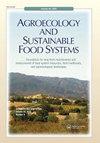Can public food procurement drive agroecological transitions? Pathways and barriers to sustainable food procurement in higher education institutions in Spain
IF 2.6
3区 农林科学
Q1 AGRICULTURE, MULTIDISCIPLINARY
引用次数: 0
Abstract
ABSTRACT Public procurement can help drive a transition to a more sustainable food system based on local agroecological production. In countries with large public education systems, school and university canteen services can play a significant role by virtue of their enormous centralized purchasing power. In this study, we investigate the potential and feasibility of implementing an enduring transformation to a sustainable food procurement model in public higher education institutions based on agroecological principles for the case of Spain. To address our research questions, we employed participatory workshops and a questionnaire survey (1,058 respondents) to analyze perceptions and priorities around sustainable food practices on campus of the university community across three Spanish public universities. Workshop participants proposed and prioritized interventions aimed at improving the sustainability of on-campus food services. Some recommendations for action for policy makers are detailed in the Discussion section, as key actors in this process. Pathways toward a future transition to more sustainable practices included the importance of food services to the university community, the high level of understanding of food system impacts and demand for change from consumers on university campuses, the universities’ commitment to the UN Sustainable Development Goals and the potential of university networks as a powerful agent of social change and social innovation.公共食品采购能否推动农业生态转型?西班牙高等教育机构可持续粮食采购的途径和障碍
本文章由计算机程序翻译,如有差异,请以英文原文为准。
求助全文
约1分钟内获得全文
求助全文
来源期刊

Agroecology and Sustainable Food Systems
AGRICULTURE, MULTIDISCIPLINARY-GREEN & SUSTAINABLE SCIENCE & TECHNOLOGY
CiteScore
4.80
自引率
7.70%
发文量
73
期刊介绍:
Agroecology and Sustainable Food Systems is devoted to the rapidly emerging fields of agroecology and food system sustainability. By linking scientific inquiry and productive practice with transformative social action, agroecology provides a foundation for developing the alternative food systems of the future. The journal focuses on the changes that need to occur in the design and management of our food systems in order to balance natural resource use and environmental protection with the needs of production, economic viability, food security, and the social well-being of all people.
Agroecology and Sustainable Food Systems examines our current food systems from production to consumption, and the urgent need to transition to long-term sustainability. The journal promotes the study and application of agroecology for developing alternatives to the complex problems of resource depletion, environmental degradation, a narrowing of agrobiodiversity, continued world hunger, consolidation and industrialization of the food system, climate change, and the loss of farm land. The journal uses a food systems approach, and seeks experiences in agroecology that are on-farm, participatory, change-oriented, and backed by broad-based methodologies of sustainability analysis and evaluation.
 求助内容:
求助内容: 应助结果提醒方式:
应助结果提醒方式:


